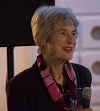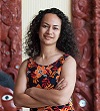Marsden Medal 2017
 Emeritus Professor Carolyn Burns CBE FRSNZ from the Department of Zoology at the University of Otago is internationally renowned for her research into freshwater ecology, especially that of the large lakes of the South Island. A recipient of the Naumann-Thienemann Medal, the world’s top award for limnology, she has had a stellar academic career.
Professor Burns has contributed her scientific expertise to conservation, for example as the Regional Councillor for Australasia and Oceania on the IUCN (World Conservation Union), as well as a long-serving member of two statutory authorities that provided advice to the Minister of Conservation – the Nature Conservation Council (chairing it 1978 – 1983) and the National Parks and Reserves Authority. Her service to science is exemplary, with examples in the assessment of research performance through her involvement on PBRF panels; through the allocation of funds for basic research (with many years of service in numerous roles on Marsden panels); through chairing academic audits of universities around New Zealand; and through the support and promotion of New Zealand scientists by serving on selection panels for a diverse array of prizes, awards and fellowships. Her leadership has influenced science direction both within and outside universities in roles such as the Director of the Board of National Institute of Water and Atmospheric Research, and as a member of the board of Antarctica New Zealand. Her scientific eminence resulted in election as a Fellow of the Royal Society of New Zealand in 1993, and she was subsequently the first woman to chair the Society’s Academy Council.
Emeritus Professor Carolyn Burns CBE FRSNZ from the Department of Zoology at the University of Otago is internationally renowned for her research into freshwater ecology, especially that of the large lakes of the South Island. A recipient of the Naumann-Thienemann Medal, the world’s top award for limnology, she has had a stellar academic career.
Professor Burns has contributed her scientific expertise to conservation, for example as the Regional Councillor for Australasia and Oceania on the IUCN (World Conservation Union), as well as a long-serving member of two statutory authorities that provided advice to the Minister of Conservation – the Nature Conservation Council (chairing it 1978 – 1983) and the National Parks and Reserves Authority. Her service to science is exemplary, with examples in the assessment of research performance through her involvement on PBRF panels; through the allocation of funds for basic research (with many years of service in numerous roles on Marsden panels); through chairing academic audits of universities around New Zealand; and through the support and promotion of New Zealand scientists by serving on selection panels for a diverse array of prizes, awards and fellowships. Her leadership has influenced science direction both within and outside universities in roles such as the Director of the Board of National Institute of Water and Atmospheric Research, and as a member of the board of Antarctica New Zealand. Her scientific eminence resulted in election as a Fellow of the Royal Society of New Zealand in 1993, and she was subsequently the first woman to chair the Society’s Academy Council.
Hill Tinsley Medal 2017
 This year’s Hill Tinsley Medal is awarded to Professor Christian Hartinger from the School of Chemical Sciences at the University of Auckland. Professor Hartinger is a leading scientist in the fields of medicinal bioinorganic, bioanalytical and bioorganometallic chemistry and is particularly known for his work on the development of metal-based anticancer drugs. He has pioneered original and creative research strategies, which have led to anticancer agents with novel modes of action, and produced insights into the fate of such compounds in biological systems. His work has significantly improved our understanding of the behaviour of metal-based anticancer agents at the molecular level.
This year’s Hill Tinsley Medal is awarded to Professor Christian Hartinger from the School of Chemical Sciences at the University of Auckland. Professor Hartinger is a leading scientist in the fields of medicinal bioinorganic, bioanalytical and bioorganometallic chemistry and is particularly known for his work on the development of metal-based anticancer drugs. He has pioneered original and creative research strategies, which have led to anticancer agents with novel modes of action, and produced insights into the fate of such compounds in biological systems. His work has significantly improved our understanding of the behaviour of metal-based anticancer agents at the molecular level.
Cranwell Medal 2017
This year our Communicators Medal is renamed to honour the botanist Dr Lucy Cranwell, a remarkable communicator of science – in a time when this was essentially unheard of.
 The winner of the 2017 NZAS Cranwell Medal (formerly the Science Communicators' Medal) is Dr Ocean Ripeka Mercier (Ngāti Porou) of Victoria University of Wellington. Dr Mercier is widely known for her role as the presenter of TV science programme Project Mātauranga, which investigates how Māori people, knowledge and methods work with the scientific community to solve a variety of problems. The programme has had repeat primetime screenings on Māori Television and now broadcasts internationally on NITV Australia. But Ocean’s contribution to the public communication of science in this way is part of nearly 2 decades of research and teaching in physics and in Māori Studies. After becoming the first Māori woman to earn a PhD in Physics, she has developed a unique programme of university lectures and courses that critically examine the sciences from Māori and international Indigenous perspectives with her Alaskan colleague Beth Leonard. Her multidisciplinary backgrounds and communication skills once prompted Prof Sir Paul Callaghan to call her a ‘bridge between [the] worlds’. Her research, teaching, service, public speaking and communication support nationwide efforts to ‘unlock the potential of Māori knowledge’ and understanding the links between mātauranga Māori and science. Dr Mercier’s sustained practice of communicating a blend of science and mātauranga to a variety of different audiences reveals her as a respected researcher and communicator working at the forefront of this field. Dr Mercier is arguably the public face of mātauranga Māori and science, and a deserving recipient of the 2017 Science Communicators’ Medal.
The winner of the 2017 NZAS Cranwell Medal (formerly the Science Communicators' Medal) is Dr Ocean Ripeka Mercier (Ngāti Porou) of Victoria University of Wellington. Dr Mercier is widely known for her role as the presenter of TV science programme Project Mātauranga, which investigates how Māori people, knowledge and methods work with the scientific community to solve a variety of problems. The programme has had repeat primetime screenings on Māori Television and now broadcasts internationally on NITV Australia. But Ocean’s contribution to the public communication of science in this way is part of nearly 2 decades of research and teaching in physics and in Māori Studies. After becoming the first Māori woman to earn a PhD in Physics, she has developed a unique programme of university lectures and courses that critically examine the sciences from Māori and international Indigenous perspectives with her Alaskan colleague Beth Leonard. Her multidisciplinary backgrounds and communication skills once prompted Prof Sir Paul Callaghan to call her a ‘bridge between [the] worlds’. Her research, teaching, service, public speaking and communication support nationwide efforts to ‘unlock the potential of Māori knowledge’ and understanding the links between mātauranga Māori and science. Dr Mercier’s sustained practice of communicating a blend of science and mātauranga to a variety of different audiences reveals her as a respected researcher and communicator working at the forefront of this field. Dr Mercier is arguably the public face of mātauranga Māori and science, and a deserving recipient of the 2017 Science Communicators’ Medal.
Shorland Medal 2017
 The 2017 Shorland Medal is awarded to the Fetal Physiology and Neuroscience Team at the University of Auckland, led by Professors Alistair Jan Gunn (Physiology and Paediatrics) (pictured) and Laura Bennet (Physiology). The team, which includes Drs Joanne Davidson and Justin Dean (Physiology) and Professor Colin Green (Ophthalmology), has made an outstanding contribution researching the major causes of death and disability in early childhood, including the identification of compromised fetuses in labour, dissecting the mechanisms of perinatal brain injury and finding new ways to treat asphyxial brain injury before and after birth. Their most influential work was a series of experimental studies that provided the foundation for understanding how, when and in whom cooling can be successfully used to reduce brain damage in babies. These studies have established cooling, a simple, practical and safe therapy, as the first treatment that significantly improves survival without disability after brain injury at birth.
The 2017 Shorland Medal is awarded to the Fetal Physiology and Neuroscience Team at the University of Auckland, led by Professors Alistair Jan Gunn (Physiology and Paediatrics) (pictured) and Laura Bennet (Physiology). The team, which includes Drs Joanne Davidson and Justin Dean (Physiology) and Professor Colin Green (Ophthalmology), has made an outstanding contribution researching the major causes of death and disability in early childhood, including the identification of compromised fetuses in labour, dissecting the mechanisms of perinatal brain injury and finding new ways to treat asphyxial brain injury before and after birth. Their most influential work was a series of experimental studies that provided the foundation for understanding how, when and in whom cooling can be successfully used to reduce brain damage in babies. These studies have established cooling, a simple, practical and safe therapy, as the first treatment that significantly improves survival without disability after brain injury at birth.
© 2024 NZAS | Disclaimer Sitemap |